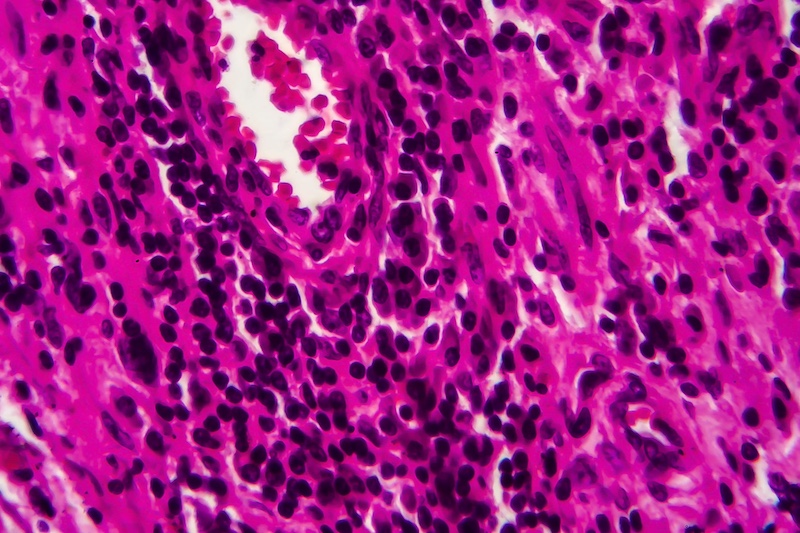Summary:
Veracyte’s whole-genome sequencing (WGS)-based MRD testing platform demonstrated higher specificity and earlier cancer detection in muscle-invasive bladder cancer (MIBC) patients compared to ddPCR-based testing and standard imaging, according to new data from the TOMBOLA trial presented at EAU25.
Key Takeaways:
- Veracyte’s MRD test detected cancer recurrence a median of 93 days earlier than imaging and had higher specificity (88% vs. 62%) than ddPCR.
- The test combines WGS and AI to track tumor progression using a patient-specific genomic signature, requiring less blood and delivering faster results.
- Veracyte aims to launch its first MRD test for MIBC in early 2026, with plans to expand to other cancers.
Veracyte, Inc. (Nasdaq: VCYT), a cancer diagnostics company, provided new data showing that its whole-genome sequencing (WGS)-based platform for minimal residual disease (MRD) testing detected cancer in patients treated for muscle-invasive bladder cancer (MIBC) with more accuracy than ddPCR-based blood testing and earlier compared to standard imaging. The findings, from the large, independent, multicenter, interventional TOMBOLA trial (NCT04138628), were shared in an oral presentation at the 40th Annual European Association of Urology Congress (EAU25) in Madrid by Iver Nordentoft, PhD, Aarhus University.
Muscle-Invasive Bladder Cancer Study Involved 100 Patients
The new study involved 100 patients enrolled in the TOMBOLA trial who had MIBC and were undergoing standard-of-care neoadjuvant chemotherapy (NAC) and radical cystectomy (RC). Their blood samples were evaluated for circulating tumor DNA (ctDNA) using both ddPCR-based and Veracyte’s WGS-based MRD testing platform to detect disease recurrence. Patients also underwent imaging. At the 6-month milestone, in comparison to ddPCR, the Veracyte MRD testing platform had an equivalent and outstanding negative predictive value (95.9% Veracyte MRD vs. 96.2% ddPCR) for cancer recurrence, while having a higher specificity (88% Veracyte MRD vs. 62% ddPCR). Longer follow-up is required to determine the clinical impact of these results. The findings also showed that the Veracyte MRD testing platform detected cancer recurrence a median of 93 days sooner than imaging. In the ongoing trial, ctDNA-positive patients are treated with immunotherapy and followed for clinical response.
“Up to half of patients with muscle-invasive bladder cancer experience recurrence within two years of initial treatment, and using ctDNA status to guide oncological treatment would spare some patients from unnecessary treatments,” says Lars Dyrskjøt Andersen, PhD, professor in the Department of Clinical Medicine and Department of Molecular Medicine at Aarhus University in Denmark and principal investigator of the TOMBOLA trial. “ctDNA testing using ddPCR has demonstrated promise for MRD detection, but it has inherent limitations that may impede its clinical use, particularly on a large scale. Our findings show that Veracyte’s whole-genome sequencing approach to MRD testing demonstrates high accuracy and may improve overall clinical utility, compared to ddPCR.”
MRD Testing Platform Uses WGS and AI
Veracyte’s MRD testing platform utilizes a combination of whole-genome sequencing and artificial intelligence (AI) to provide fast and accurate detection of residual cancer in a patient’s blood sample. This approach requires less blood and offers faster results, compared to ctDNA testing that uses bespoke panels, enabling earlier detection and improved outcomes. Veracyte’s MRD testing platform characterizes the complete set of cancer mutations in the tumor tissue sample and blood to establish a patient-specific, landmark genomic signature. It then uses whole-genome sequencing and AI to detect that signature in subsequent blood samples, indicating that cancer is present, and to track tumor progression throughout the patient’s treatment and follow-up care. Veracyte plans to launch its first MRD test in muscle-invasive bladder cancer in the first half of 2026, with other cancer indications to follow.
“The new data presented at EAU25 reinforce the power of the Veracyte Diagnostics Platform, which is at the core of all of our tests and will now enable us to expand into MRD testing in a clinically meaningful way,” says Philip Febbo, MD, Veracyte’s chief scientific officer and chief medical officer. “With our first MRD test in muscle-invasive bladder cancer, we are excited to expand our test offerings along the care continuum in urologic cancers where our Decipher tests are widely used and trusted by clinicians to help guide prognosis and treatment decisions.”
Featured Image; Kateryna Kon | Dreamstime.com





